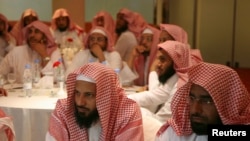Saudi Arabia announced Wednesday that its frequently criticized religious police force no longer has the authority to arrest citizens, and must now strive to "kindly and gently" enforce Islamic rules.
The new guidelines for the Haia force, also known as the Mutawaa, were approved by the Cabinet and published Tuesday, mandating that only police and drug squad officers have the jurisdiction to make arrests.
"Neither the heads nor members of the Haia are to stop or arrest or chase people or ask for their IDs or follow them - that is considered the jurisdiction of the police or the drug unit," the regulations say.
Formally known as the Commission for the Promotion of Virtue and Prevention of Vice, Haia members enforce the country's strict interpretation of Islam, by, for example, ensuring that women are covered from head to toe in public, that they are not mingling with unrelated men, and that all shops are closed during the five daily prayers.
Mutawa tactics have been under scrutiny particularly after members were arrested for allegedly assaulting a young woman outside a Riyadh shopping mall in February, said local media at the time.
Another high profile case in 2013 resulted in two religious policemen being arrested after their patrol car crashed into another vehicle during a chase that left two men dead.
The controversial Mutawas were barred from interrogating and pressing charges in 2013, but abuses were said to have continued. Still, Saudis such as well-known cultural and societal blogger Eman al-Nafjan told the French news agency, AFP, that this time will be different. "I'm very confident because there are so many people that are for these changes," she said.
"I believe it's a very good change," said the former head of Mecca's religious police, Sheikh Ahmed al-Ghamdi, but added the change could have come even sooner.
There was no immediate comment from the Mutawaa, and its website could not be accessed Wednesday.




